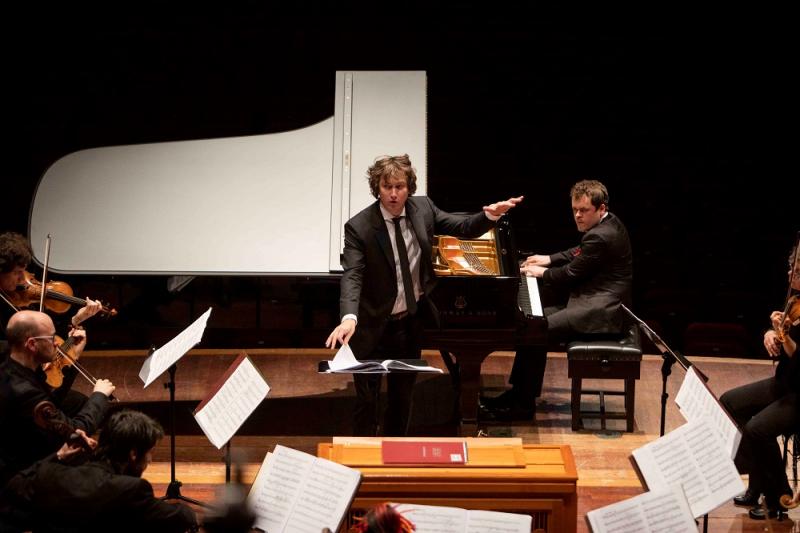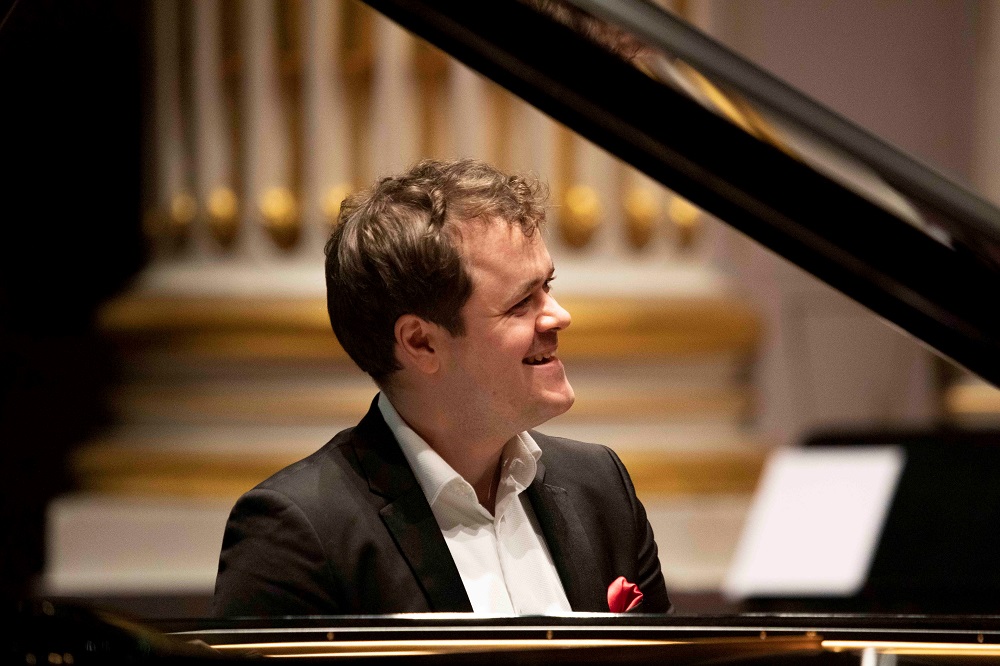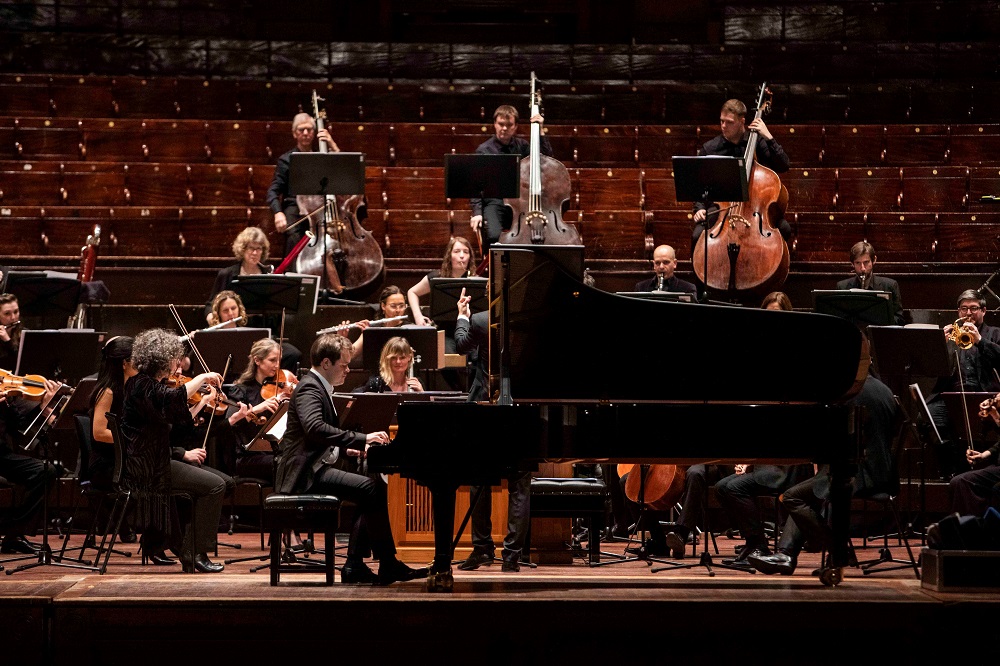Grosvenor, SCO, Emelyanychev, Usher Hall, Edinburgh review - lightness of touch and a sprinkling of humour | reviews, news & interviews
Grosvenor, SCO, Emelyanychev, Usher Hall, Edinburgh review - lightness of touch and a sprinkling of humour
Grosvenor, SCO, Emelyanychev, Usher Hall, Edinburgh review - lightness of touch and a sprinkling of humour
Romantic music played with period style, and the pianist finds the wit in Mendelssohn

Nobody would describe Felix Mendelssohn as a fringe composer, but his piano concertos aren’t exactly central classical repertoire either. They lack the foundational status of Mozart’s and the high Romantic seriousness of Beethoven’s or Brahms’, and Mendelssohn doesn’t help himself in the way that an air of the faintly hilarious hangs around his First Piano Concerto.
It’s often so hyperactive that it’s impossible to take it seriously, with an almost comically energetic first movement that feels like a greyhound straining at the trap, and a finale so light-hearted that it’s almost a self-parody.
So it’s a credit to both pianist Benjamin Grosvenor (pictured below) and conductor Maxim Emelyanychev that, in this Scottish Chamber Orchestra performance, they resisted the temptation to take it too heavily and instead got the balance of beauty and frivolity just about right. Grosvenor’s punchy chords and hectic runs seemed spiced with a little sprinkling of humour, and that suited the music really well. After all, this is the sort of concerto you could imagine Bugs Bunny playing in a Looney Tunes parody, and both the highly strung first movement and the filigree finale were played with a winning lightness of touch.  Moments of lyrical songfulness were balanced against this, however, from both soloist and orchestra, nowhere more so than in the lovely slow movement where Grosvenor took every opportunity to play with ringing bel canto clarity, balancing the high-voltage energy of the outer movements, and the orchestra responded in kind, the violas and cellos not so much playing the main theme of the Andante as caressing it.
Moments of lyrical songfulness were balanced against this, however, from both soloist and orchestra, nowhere more so than in the lovely slow movement where Grosvenor took every opportunity to play with ringing bel canto clarity, balancing the high-voltage energy of the outer movements, and the orchestra responded in kind, the violas and cellos not so much playing the main theme of the Andante as caressing it.
It helped that the orchestra was playing with natural brass and timps, and that the strings were using their vibrato very sparingly. That added extra colour not only to Mendelssohn’s concerto but also to Schumann’s Symphony No. 4 (in the revised version). With this playing and Emelyanychev’s sense of direction, the symphony emerged as a model of concision with each theme emerging organically from the one before, and every phrase carefully articulated. Particularly masterful was the transition to the finale, with strings slowly coalescing over portentous brass fanfares, leading into a final movement of exuberant energy. Not quite of joy, however. Even in Emelyanychev’s hands, this was a finale that didn’t quite brim over, and a symphony that never quite managed to achieve consummation. This was a fine performance, but it lacked that final edge of jubilation that its richest interpreters find buried within it.  Some would argue that that’s more Schumann’s fault than the performers’. Maybe, but there’s a more clear-cut case of blame when it comes to Brahms’ Tragic Overture, in which the composer loses sight of the structural surety that he displays with such mastery elsewhere and ends up evoking a generalised mood through some note-spinning longueurs. The SCO played it with surprising silkiness in the period strings, and Emelyanychev shaped it with a nice sense of edge, but not even they could dissuade me from the view that Brahms should have stripped at least five minutes off it. Where’s the editor when you need him?
Some would argue that that’s more Schumann’s fault than the performers’. Maybe, but there’s a more clear-cut case of blame when it comes to Brahms’ Tragic Overture, in which the composer loses sight of the structural surety that he displays with such mastery elsewhere and ends up evoking a generalised mood through some note-spinning longueurs. The SCO played it with surprising silkiness in the period strings, and Emelyanychev shaped it with a nice sense of edge, but not even they could dissuade me from the view that Brahms should have stripped at least five minutes off it. Where’s the editor when you need him?
rating
Explore topics
Share this article
The future of Arts Journalism
You can stop theartsdesk.com closing!
We urgently need financing to survive. Our fundraising drive has thus far raised £49,000 but we need to reach £100,000 or we will be forced to close. Please contribute here: https://gofund.me/c3f6033d
And if you can forward this information to anyone who might assist, we’d be grateful.

Subscribe to theartsdesk.com
Thank you for continuing to read our work on theartsdesk.com. For unlimited access to every article in its entirety, including our archive of more than 15,000 pieces, we're asking for £5 per month or £40 per year. We feel it's a very good deal, and hope you do too.
To take a subscription now simply click here.
And if you're looking for that extra gift for a friend or family member, why not treat them to a theartsdesk.com gift subscription?
more Classical music
 Kilsby, Parkes, Sinfonia of London, Wilson, Barbican review - string things zing and sing in expert hands
British masterpieces for strings plus other-worldly tenor and horn - and a muscular rarity
Kilsby, Parkes, Sinfonia of London, Wilson, Barbican review - string things zing and sing in expert hands
British masterpieces for strings plus other-worldly tenor and horn - and a muscular rarity
 From Historical to Hip-Hop, Classically Black Music Festival, Kings Place review - a cluster of impressive stars for the future
From quasi-Mozartian elegance to the gritty humour of a kitchen inspection
From Historical to Hip-Hop, Classically Black Music Festival, Kings Place review - a cluster of impressive stars for the future
From quasi-Mozartian elegance to the gritty humour of a kitchen inspection
 Shibe, LSO, Adès, Barbican review - gaudy and glorious new music alongside serene Sibelius
Adès’s passion makes persuasive case for the music he loves, both new and old
Shibe, LSO, Adès, Barbican review - gaudy and glorious new music alongside serene Sibelius
Adès’s passion makes persuasive case for the music he loves, both new and old
 Anja Mittermüller, Richard Fu, Wigmore Hall review - a glorious hall debut
The Austrian mezzo shines - at the age of 22
Anja Mittermüller, Richard Fu, Wigmore Hall review - a glorious hall debut
The Austrian mezzo shines - at the age of 22
 First Person: clarinettist Oliver Pashley on the new horizons of The Hermes Experiment's latest album
Compositions by members of this unusual quartet feature for the first time
First Person: clarinettist Oliver Pashley on the new horizons of The Hermes Experiment's latest album
Compositions by members of this unusual quartet feature for the first time
 Gesualdo Passione, Les Arts Florissants, Amala Dior Company, Barbican review - inspired collaboration excavates the music's humanity
At times it was like watching an anarchic religious procession
Gesualdo Passione, Les Arts Florissants, Amala Dior Company, Barbican review - inspired collaboration excavates the music's humanity
At times it was like watching an anarchic religious procession
 Classical CDs: Camels, concrete and cabaret
An influential American composer's 90th birthday box, plus British piano concertos and a father-and-son duo
Classical CDs: Camels, concrete and cabaret
An influential American composer's 90th birthday box, plus British piano concertos and a father-and-son duo
 Cockerham, Manchester Camerata, Sheen, Martin Harris Centre, Manchester review - re-enacting the dawn of modernism
Two UK premieres added to three miniatures from a seminal event of January 1914
Cockerham, Manchester Camerata, Sheen, Martin Harris Centre, Manchester review - re-enacting the dawn of modernism
Two UK premieres added to three miniatures from a seminal event of January 1914
 Kempf, Brno Philharmonic, Davies, Bridgewater Hall, Manchester review - European tradition meets American jazz
Bouncing Czechs enjoy their Gershwin and Brubeck alongside Janáček and Dvořák
Kempf, Brno Philharmonic, Davies, Bridgewater Hall, Manchester review - European tradition meets American jazz
Bouncing Czechs enjoy their Gershwin and Brubeck alongside Janáček and Dvořák
 Solomon, OAE, Butt, QEH review - daft Biblical whitewashing with great choruses
Even a top soprano and mezzo can’t make this Handel paean wholly convincing
Solomon, OAE, Butt, QEH review - daft Biblical whitewashing with great choruses
Even a top soprano and mezzo can’t make this Handel paean wholly convincing
 Two-Piano Gala, Kings Place review - shining constellations
London Piano Festival curators and illustrious friends entertain and enlighten
Two-Piano Gala, Kings Place review - shining constellations
London Piano Festival curators and illustrious friends entertain and enlighten
 Echo Vocal Ensemble, Latto, Union Chapel review - eclectic choral programme garlanded with dance
Beautiful singing at the heart of an imaginative and stylistically varied concert
Echo Vocal Ensemble, Latto, Union Chapel review - eclectic choral programme garlanded with dance
Beautiful singing at the heart of an imaginative and stylistically varied concert

Add comment